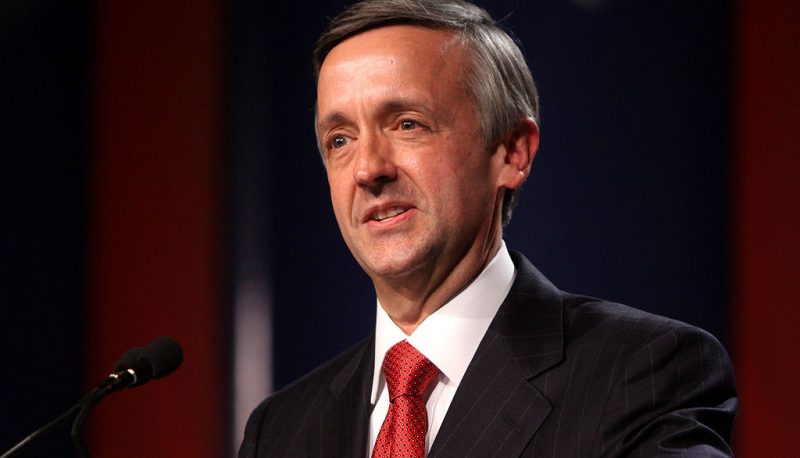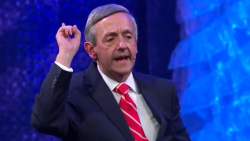Analysis
Of all President Donald Trump’s conservative evangelical sycophants, perhaps none is more relentless in his cheerleading for Trump than Robert Jeffress, pastor of First Baptist Church in Dallas and a frequent Trump enthusiast on Fox News. Jeffress is getting ready to roll out his latest book, which suggests that America’s problems boil down to a simple explanation: “We have forgotten God.”
As part of the promotional campaign for “Praying for America: 40 Inspiring Stories and Prayers for our Nation,” five short chapters are available for free download from the book’s publisher. The introduction says that each chapter “features an inspiring story that demonstrates the power of faith in the life of our nation” along with scripture passages and a suggested prayer.
“When Jesus taught His disciples to pray in Matthew 6:5–13, He made it clear that the purpose of prayer is not to get our will done in heaven but to get God’s will done on earth,” Jeffress writes. “And if ever there was a time when we needed God’s will done in America, that time is now!”
“For God’s Will to Be Done,” the first chapter, encourages people to “support God-honoring values” during elections. “When you cast a vote for a candidate, you are voting either for righteousness or unrighteousness,” he write.
The second chapter warns, “Our religious freedoms are being taken away at an alarming rate.” God “wants us to pray—and fight—to keep what others have already won for us,” Jeffress writes:
In these last days before Christ’s return, Christians will increasingly be challenged to stand against those who attempt to abrogate our constitutional rights and our biblical mandate to spread the message of Jesus Christ. But in doing so, we don’t have to act like jerks. We must pick our battles carefully, be respectful of the governmental authorities that God has established, and be willing to suffer the consequences of our disobedience.
Surely Jeffress gets that many Trump supporters love him precisely because he acts like a jerk, following in the footsteps of right-wing radio and TV figures who built careers based on insulting and demeaning liberals.
In chapter three, Jeffress lifts up the importance of defending truth. “You have called every Christian to stand up for truth,” says the chapter’s suggested prayer. “In the short term lies can do immense harm. Motivate Your people to stand for truth and free speech.” It takes a remarkable level of chutzpah or self-deception or both for an ardent defender of the perpetually lying Trump to position himself as a defender of truth, but Jeffress has plenty of practice.
The chapter also denounces “fake news” and warns that charges of racism and hate speech are used to shut down dissent. It repeats right-wing charges that social media platforms are engaged in “dangerous” suppression of conservative voices and warns that “those who suppress the truth” are courting God’s wrath.
The chapter does include one piece of advice that Jeffress’s followers would be wise to apply to his own writings: “develop a healthy skepticism over anything you hear or read online.”
The fourth chapter, “For Protection from Our Enemies,” includes a reference to the Oklahoma City bombing as an example of the actions of a domestic enemy. But it also lumps in—without any discussion, evidence, or justification—the anti-fascist network Antifa as a domestic terrorist threat:
From foreign threats like radical Islamic terrorists, to cyber threats like the Chinese government, to domestic terrorist threats like Antifa, to people who are taught to hate our country or to disrespect authority, Americans share this world with many enemies who would harm us.
Jeffress offers several reasons that some people might hate America: they focus more on our faults than virtues; they want to destroy America to build their own power; they disapprove of U.S. support for Israel; or “because we are a nation built on Christian values.” But it really gets back to one thing:
All irrational hatred begins with evil desires and the lies of Satan. At root, it is a spiritual problem. And at the spiritual level, believers fight evil and falsehood with Christian love and gospel truth. However, even though the battle begins in the spiritual realm, it often extends into our physical world. When it does so, it threatens physical harm to us and to our countrymen. And we must oppose it.
Chapter 5, the last of the free chapters released as a teaser for the book, is entitled “For National Unity.” Jeffress cites the 1969 moon landing as an event that unified the county even in the wake of the assassinations and social chaos of 1968. The chapter encourages people to pray for greater unity among Christians and in “our divided nation.”
“Ask God to silence those who strive to spread division and hatred and to bring any slanderers in the media to repentance,” Jeffress writes. Well, what about the slanderer in the Oval Office, who spent part of Memorial Day weekend charging a journalist he hates with having committed murder, against all evidence to the contrary? Has Jeffress called Trump to repentance for the way his campaign and administration spread division and hatred?
Jeffress also encourages people to “engage in civil discourse with those with whom we disagree.” Now, “civil discourse” doesn’t exactly bring to mind Trump’s sneering contempt for his critics or Trump spiritual adviser Paula White denouncing his political opponents as demonic and anti-God. And it certainly doesn’t seem to apply to Jeffress’s own actions as a Trump surrogate in the media, where he has mocked Nancy Pelosi’s faith, warned that the left is just waiting to regain political power to wage “intensive” attacks against the Church, and railed against Democratic leaders, saying, “Apparently the god they worship is the pagan god of the Old Testament, Moloch, who allowed for child sacrifice … I think the god they are worshiping is the god of their own imagination.”
How civil and unifying. I can hardly wait for the remaining 35 chapters.









